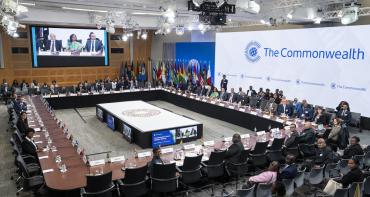The Secretary-General has told BBC News that Commonwealth ministers and parliamentarians have asked her to help them respond to the crisis of irregular mass movement of people across the world by coming up with a plan.

The Secretary-General has told BBC News that Commonwealth ministers and parliamentarians have asked her to help them respond to the crisis of irregular mass movement of people across the world by coming up with a plan.
Leaders agreed to increase national and international efforts to tackle the causes of irregular migration at the Commonwealth Heads of Government Meeting (CHOGM) in Malta last year. Actions included the prevention of violent extremism and terrorism, combatting organised crime, ending human trafficking and modern day slavery, while reinforcing the respect for human rights
The request to move forward was made during the “Migration in the Commonwealth: International Movement and Human Rights – Challenges and Opportunities” event at the United Nations today (18 September). The panel included ministers and parliamentarians from Kenya, Bangladesh and Tonga.
Secretary-General Scotland said, “The panel made it clear they wanted real action to end irregular migration. Kenya’s foreign minister Dr Amina Mohamed and other leaders have asked me to push ahead and create a pragmatic strategy to do so.”
International migration is a complex issue, said the Secretary-General, caused by several factors including political, economic, violent extremism and terrorism as well as climate change.
She told the BBC that most people imagined migration to be a problem in and for the West. But it remains a big challenge for the Commonwealth, said Secretary-General Scotland, citing several examples
- 80% of refugees are hosted in the developing world
- Pakistan hosts more than 1.7 million refugees, more than any other country in the world
- African countries account for 40% of all Internally Displaced Persons (IDPs)
- Conflicts in the Democratic Republic of Congo, Sudan and Somalia are crucial factors which lead to the increase in refugees in East Africa, particularly Uganda and Kenya
- Of the more than 850,000 asylum seekers worldwide, nearly 200,000 are present in South Africa alone
- East Africa, Southern Africa, the Caribbean and South Pacific regions of the Commonwealth are particularly vulnerable to migration based on the effect of climate change
The Secretary-General said she took today’s request from the panel very seriously and explained that the benefits could not be unlocked unless deliberate and intelligently designed migration governance structures were put in place.
“Few people want to leave their homes and their families. Imagine the people who have to flee their homelands because of terrorism, violent extremism, war, famine and climate change. Women and children die trying to survive. Surely it is up to us, everyone, to work together to give them safe harbour?”
So far, just 48 UN member states have ratified the International Convention on the Protection of the Rights of All Migrant Workers and Members of their Families. 13 of these are Commonwealth member states and Secretary-General Scotland urged more countries to sign up.



